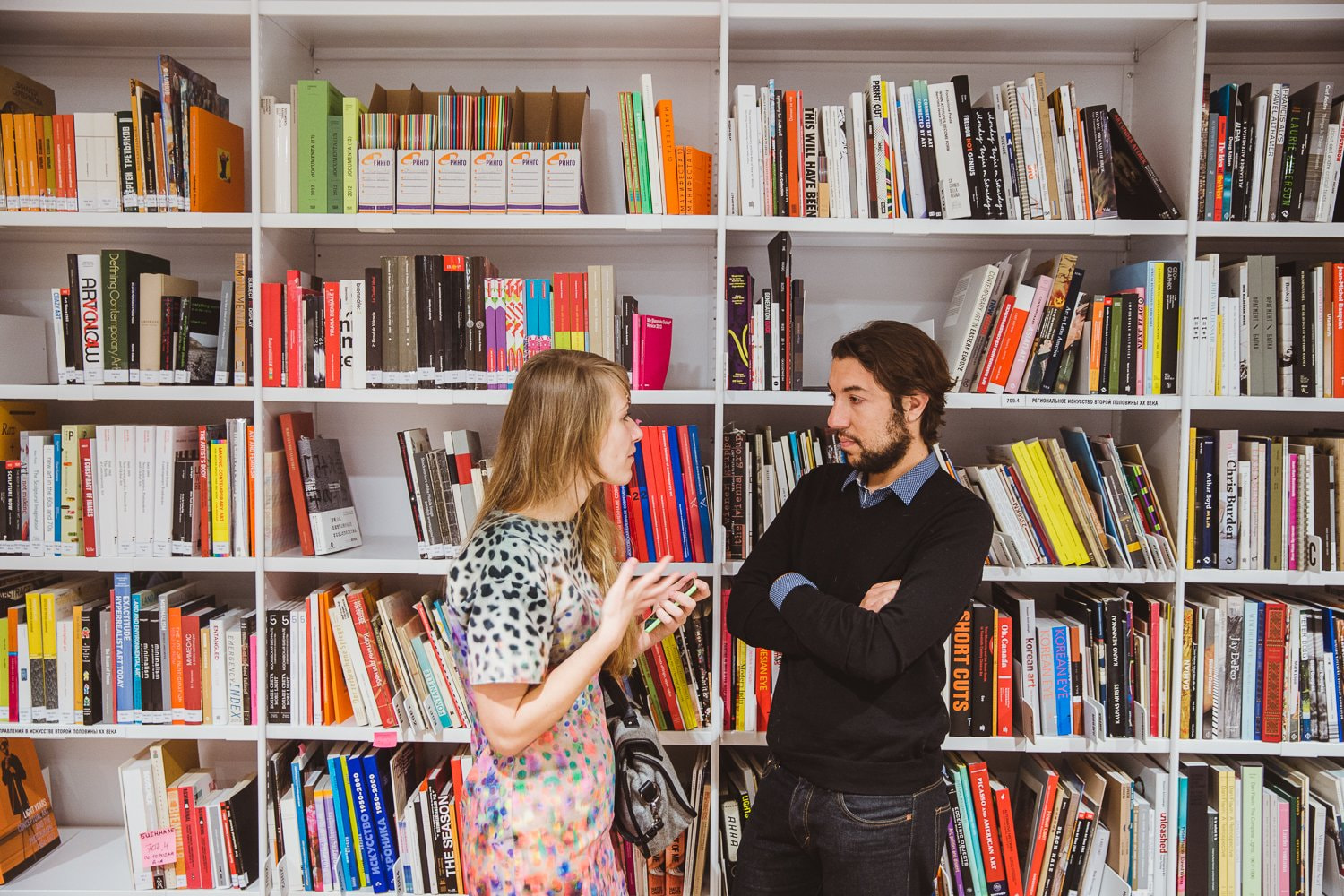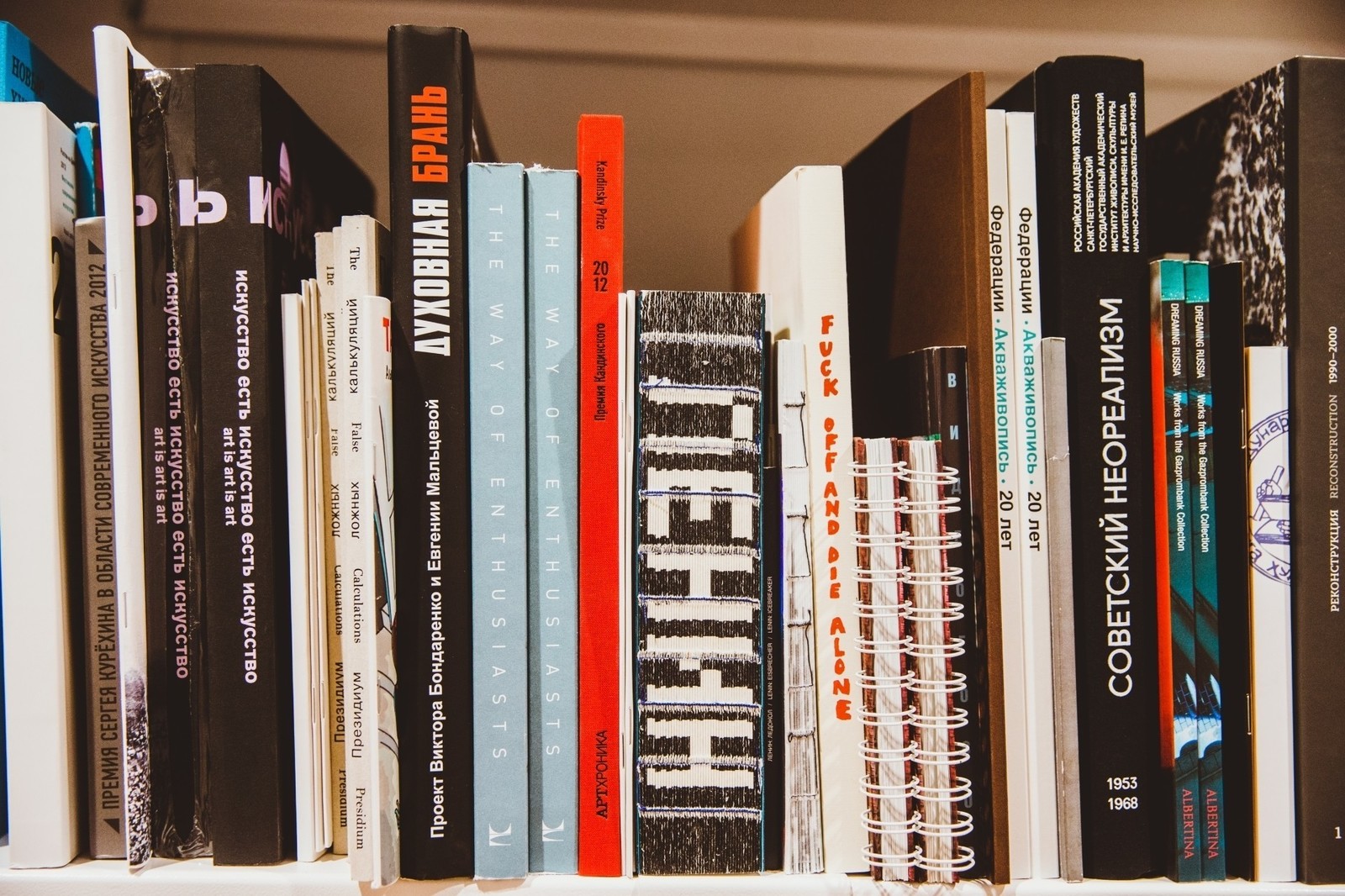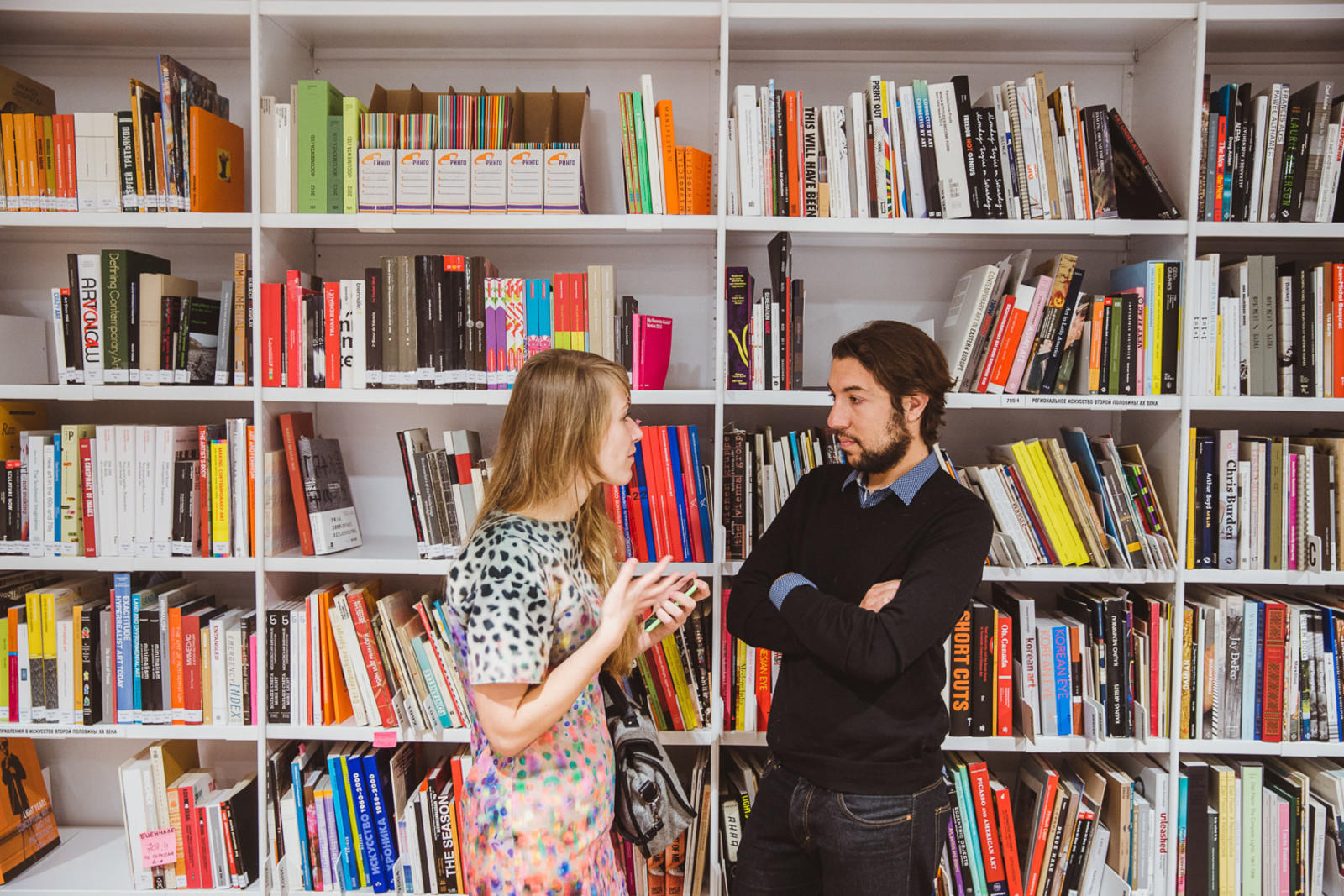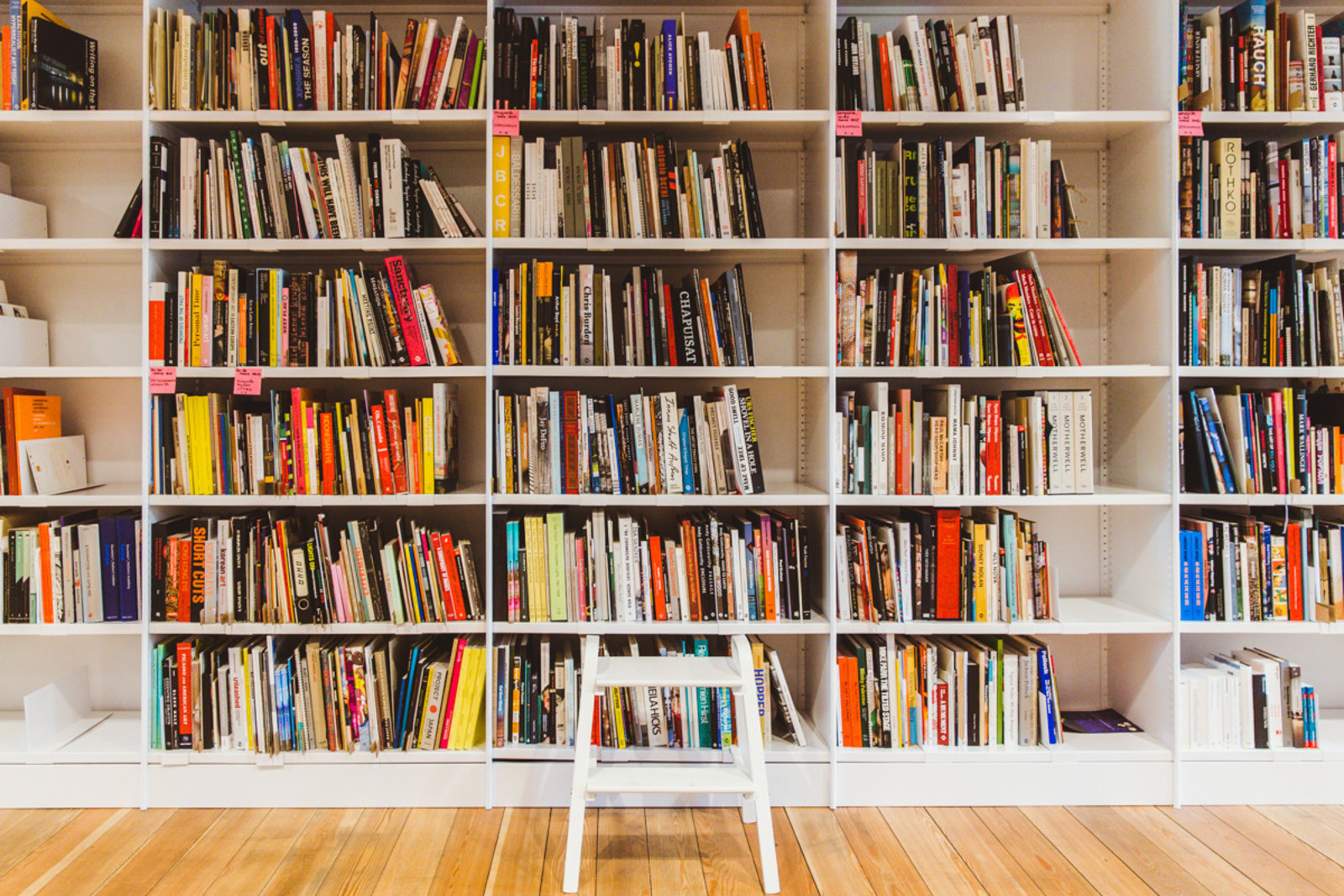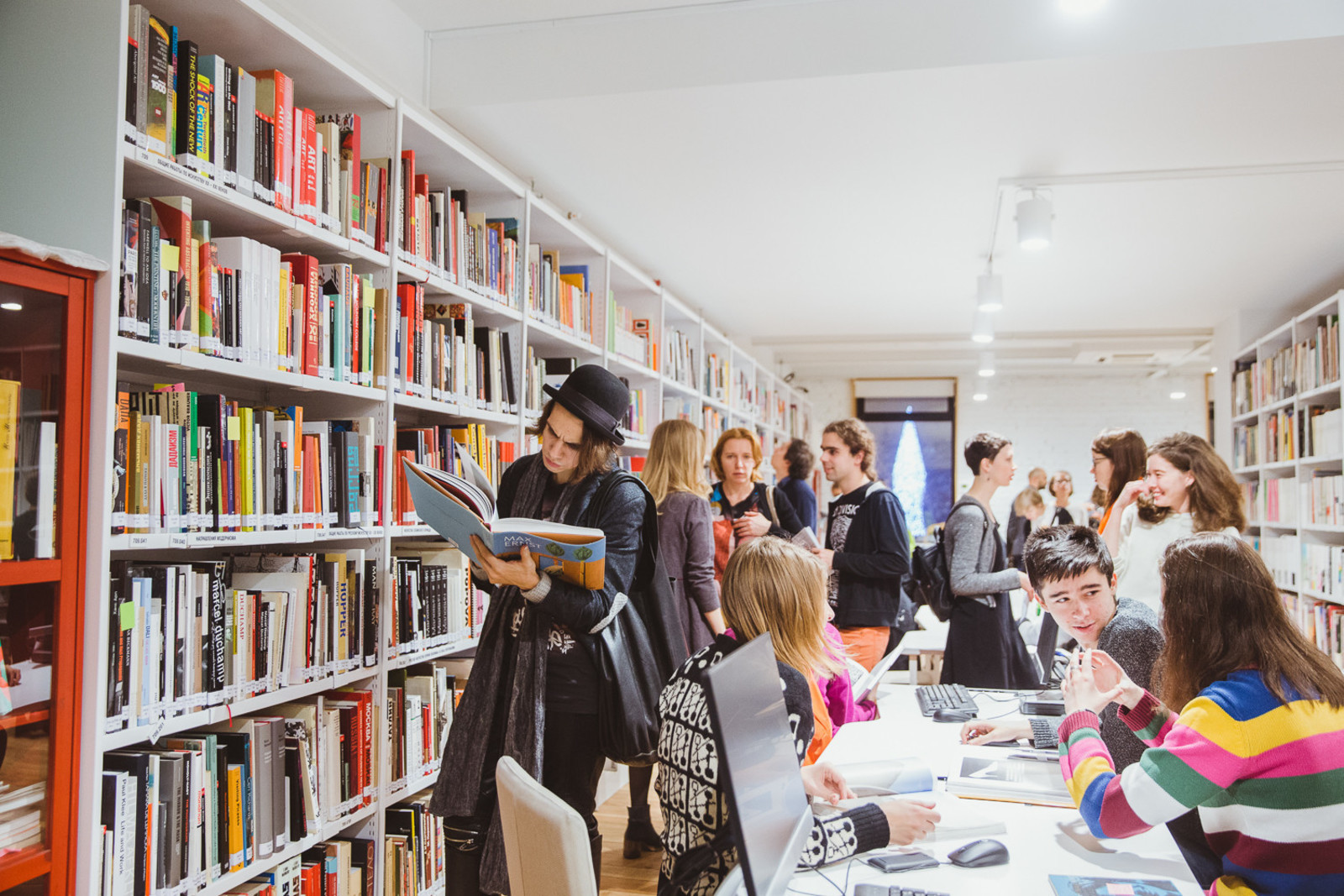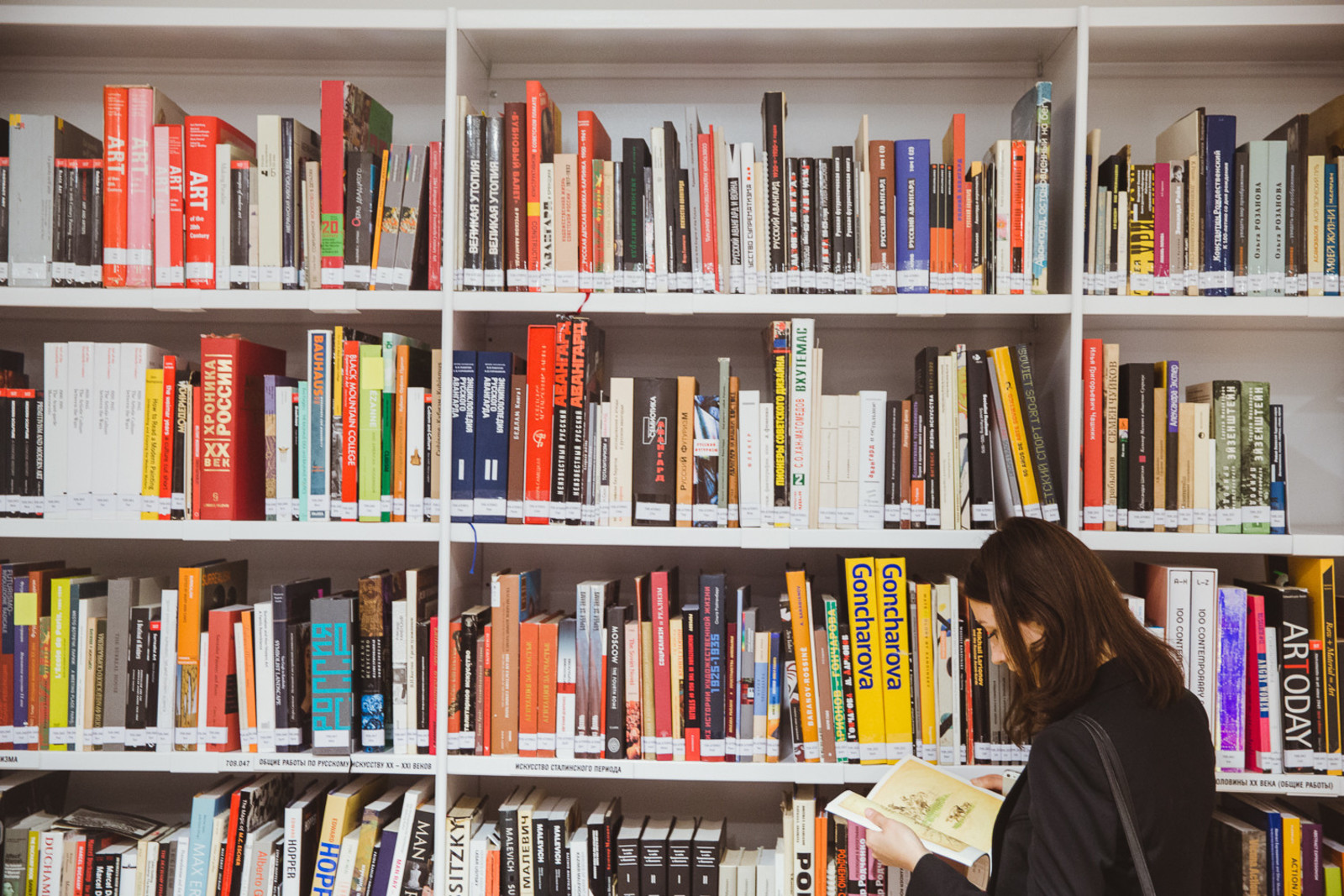Mondays, Tuesdays, and Fridays from 19:00 to 21:00
We are pleased to announce the launch of a new project, Garage Library’s reading groups. These aim to familiarize readers with the Library’s collection and its development as an intellectual, educational, and research center.
Each group will take part in a series of meetings based upon a specific theme, where participants will discuss books related to the subject with a moderator.
Please check the schedule below.
Admission is free, but spaces are limited. Please register in advance by calling + 7 (495) 645-05-20.
READING GROUP SCHEDULE MAY–JUNE 2015
READING GROUP 1: FEMINISM AND CONTEMPORARY ART
This reading group will discuss a wide range of texts that touch upon the problems associated with the criticism of feminist art from an aesthetic point of view. It will also focus on feminist media strategy and its practical use in a Russian context, and will conclude with discussions about maternity and physicality.
Moderator: Mika Ela – artist, feminist activist, and organizer of the "Kitchen" women’s art workshops
Friday, May 22, 19:00–21:00, Garage Education Center, Area 1
Rita Felski: Why Feminism Doesn’t Need an Aesthetic, and Why It Can’t Ignore Aesthetics
Gender Theory and Art Anthology: 1970–2000, ed. L. Bredikhna and K. Dipuell, Moscow: Russian Political Encyclopedia, 2005: 471–94.
Friday, June 5, 19:00–21:00, Garage Education Center, Area 1
Suzanne Lacy and Leslie Labowit: Feminist Media Strategies for Political Performance
The Feminism and Visual Culture Reader, ed. Amelia Jones, New York: Routledge, 2010: 400–10.
Friday, June 26, 19:00–21:00, Garage Education Center, Area 1
Andrea Liss: The Body in Question: Rethinking Motherhood, Alterity and Desire
New Feminist Criticism: Art, Identity, Action, ed. Joanna Frueh, Cassandra L. Langer, Arlene Raven, New York: HarperCollins Publishers, 1994: 80–96.
READING GROUP 2: MARXISM AND CONTEMPORARY CULTURE (registration is closed)
The tradition of Marxist theory, despite the decline in activity within its framework, continues to be fundamental to the intellectual landscape of modernity. This group will read and discuss extracts from the founding texts of this tradition. Discussions will not be aimed at an apologetics of the theory, but at familiarization with its "alphabet," intended to help illuminate the problems and themes that are influenced by Marxism.
Moderator: Vlad Sofronov, Ph.D. – independent researcher, author of Communist Sensuality: Reading Kierkegaard, Proust, Kafka, Marx (Moscow, 2009), and translator of Slavoj Žižek’s Sublime Object of Ideology and Arthur Lovejoy’s Great Chain of Being, as well as a member of the editorial boards of Logos, Art Magazine, and others.
Tuesday, 26 May, 19:00–21:00, Garage Education Center, Area 1
Social Production, Productive Forces, and Relations of Production
Karl Marx, “Contribution to the Critique of Political Economy,” Preface, K. Marx and F. Engels, Selected Works, 9 v. V. 4. Moscow: Political Literature Publishing House, 1985: 136–40.
Friedrich Engels, Anti-Dühring, Section III “Socialism," Ch. II "Essay on Theory," K. Marx and F. Engels, Works, 2nd ed., Moscow: Politizdat, 1961: 278–95.
Tuesday, June 2, 19:00–21:00, Garage Education Center, Area 1
The Social Classes and the War Between them as a Classic Theme of Marxism
Karl Marx and Friedrich Engels, “The Communist Manifesto,” K. Marx and F. Engels, Selected Works, 9 v. V. 3. Moscow: Political Literature Publishing House, 1985: 139–89.
Vladimir Lenin, “A Great Beginning,” V. Lenin, Selected Works, 10 v. V. 4. Moscow: Politizdat, 1985: 1-22.
Tuesday, June 9, 19:00–21:00, Garage Education Center, Garage Library
The State and its Apparatus
Vladimir Lenin, The State and Revolution. Marxist Theory of the State and Tasks of the Proletariat in the Revolution, Moscow: Political Literature Publishing House, 1983: 5–22.
Tuesday, June 16, 19:00–21:00, Garage Education Center, Area 1
Religion: "Opiate of the Masses" or "Opiate for the Masses"?
Karl Marx, “Contribution to the Critique of Hegel's Philosophy of Right,” Introduction, K. Marx and F. Engels, Selected Works, 9 t. T. 1. Moscow: Political Literature Publishing House, 1985: 1–14.
Vladimir Lenin, “Socialism and Religion,” V. Lenin, Selected Works, 10 v. V. 4. Moscow: Politizdat, 1985: 309–12.
Tuesday, June 23, 19:00–21:00, Garage Education Center, Area 1
Culture as a Mirror of Society
Vladimir Lenin, “Leo Tolstoy as a Mirror of the Russian Revolution,” V. Lenin, Articles on Tolstoy, Moscow: OGIZ, 1949: 3–8.
Vladimir Lenin, “Leo Tolstoy and His Era,” V. Lenin, Articles on Tolstoy, Moscow: OGIZ, 1949: 30–34.
Tuesday, June 30, 19:00–21:00, Garage Education Center, Area 1
Culture as a Mirror of Society
Leon Trotsky, “Formal School of Poetry and Marxism,” L. Trotsky, Literature and Revolution, Moscow: Politizdat, 1991: 130–45.
READING GROUP 3: MAJOR THEORETICAL APPROACHES TO THE ART OF THE 20TH CENTURY (registration is closed)
The constant and rapid development of aesthetic production in the 20th century was inseparably connected with—if not directly visible to the public, and even to the artists—the theories of many prominent thinkers. In this series of reading groups, participants will read and discuss specially selected texts by theorists of the 20th century that reflect their key intellectual ideas and are easily understood by non-experts.
Moderator: Vlad Sofronov, Ph.D. – independent researcher, author of Communist Sensuality: Reading Kierkegaard, Proust, Kafka, Marx (Moscow, 2009), and translator of Slavoj Žižek’s Sublime Object of Ideology and Arthur Lovejoy’s Great Chain of Being, as well as a member of the editorial boards of Logos, Art Magazine, and others.
Monday, May 25, 19:00–21:00, Garage Education Center, Garage Library
Semiotics / Structuralism
Roland Barthes, “Textual Analysis of a Short Story by Edgar Allan Poe,” R. Barthes, Selected Works: Semiotics, Poetics, Moscow: Progress, 1989: 424–62.
Edgar Allan Poe, “The Facts in the Case of Mr. Valdemar,” E. Poe, Complete Collection of Short Stories, Moscow: Sciences, 1970: 636–42.
Monday, June 1, 19:00–21:00, Garage Education Center, Garage Library
Semiotics / Structuralism
Ferdinand de Saussure, “Nature of the Linguistic Sign,” F. de Saussure, Works on Linguistics, Moscow: Progress, 1977: 98–111.
Monday, June 8, 19:00–21:00, Garage Education Center, Garage Library
Semiotics / Structuralism
Claude Levi-Strauss, “Overture II,” C. Levi-Strauss, Mythology: The Raw and the Cooked. Moscow: Fluid, 2006: 22–37.
Monday, 15 June, 19:00–21:00, Garage Education Center, Garage Library
Hermeneutics
Hans-Georg Gadamer, “Afterword,” G. Gadamer, Truth and Method, Moscow: Book on Demand, 2012: 615–46.
Monday, June 22, 19:00-21:00, Garage Education Center, Garage Library
Hermeneutics
Hans-Georg Gadamer, “Art and Imitation,” G. Gadamer, The Relevance of the Beautiful and Other Essays, Moscow: Art, 1991: 228–41.
Monday, June 29, 19:00–21:00, Garage Education Center, Garage Library
Hermeneutics
Hans-Georg Gadamer, “The Relevance of the Beautiful,” G. Gadamer, The Relevance of the Beautiful and Other Essays, Moscow: Art, 1991: 266–323.
Monday, July 6, 19:00–21:00, Garage Education Center, Garage Library
Hermeneutics
Continued discussion of the work of Hans-Georg Gadamer, “The Relevance of the Beautiful,” G. Gadamer, The Relevance of the Beautiful and Other Essays, Moscow: Art, 1991: 266–323.
READING GROUP TOPICS FOR SEPTEMBER – DECEMBER 2015
From September to December, reading groups will continue to focus on the themes Feminism and Contemporary Art, Marxism and Contemporary Culture, and Major Theoretical Approaches to Art in the 20th Century. In the reading group Major Theoretical Approaches to Art in the 20th Centur, participants will discuss phenomenology, Marxism, analytic philosophy, and psychoanalysis, as well as reading and discussing texts on the formation of new social classes and their relationship with contemporary culture, artistic practices in urban spaces, collective memory and the arts, and finally, cultural production and its criticism.
